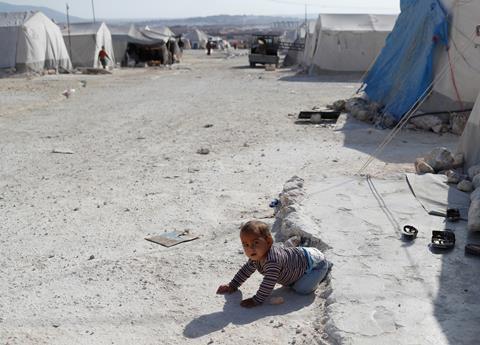Campaigner Samara Levy shares a bleak picture of what life is like for those in Syria at the moment and what Christians can do to help.

With a heavy heart I returned from Syria, just ten days before the earthquake struck. The chronic, spiralling insufficiency and suffering pervading this war-torn country had sunk to its lowest stage yet this winter. After many trips to Syria over the years, this was the first time I had sat in the darkness with no water or electricity in the evening because the solar power batteries and the water had run out. Thirty minutes of electricity every six hours on a good day, and water arriving at the taps only every three or four days - for just an hour or two - was now the life that the majority could expect across the country.
The fuel crisis in Syria had reached such harrowing lows that December saw the majority of public transport - even ambulances - suspended because there was insufficient fuel to run them, and a ten-day holiday declared to ease the burden on public all services requiring fuel.
Thirty minutes of electricity every six hours on a good day, and water arriving at the taps only every three or four days.
One would expect a crisis of this nature to affect transport and deliveries, but the scale at which food and commodity prices have soared year on year is bewildering. The effect on the average person’s ability to heat, cook or even wash, demonstrates a level we simply cannot imagine. The odour of unwashed children permeated the rooms during lessons at our outreach centres for orphans and vulnerable children. Black grime lay deeply ingrained in each crease on some children’s hands. Many of these vulnerable children we serve would not only go without washing, but also without a cooked meal for months if we didn’t provide one every day in our centres. The lack of fuel even impacts cooking.
Who could believe that people are still living in war-damaged buildings with no windows to protect them from the elements? Fuel scarcity adds insult to injury in the depleted healthcare system, lacking electricity and generator fuel, which in turn leaves more than 15 million people needing humanitarian healthcare assistance. That was before the earthquake.
The aftershocks continued for days bringing down further buildings, robbing this already traumatised people of any feeling of safety they could have tried to muster. How does a country, crippled by such devastation and lack of resources begin to respond to a catastrophe of this scale? It’s deeply alarming to see how little of the world’s aid has been directed to Syria.
Black grime lay deeply ingrained in each crease on some children’s hands.
Despite suffering personally in the earthquakes our local team were already well established and trained serving the people in Syria. They have been importing and distributing our aid there for many years as well as providing medical aid. They know how to navigate the complex system to ensure that what we package and send from the UK reaches the most needy.
Our team have been working in the most affected areas, screening the damage, the people, and the need. They watched as a family was dug up from from the rubble that had been their home: a boy with minimal injuries, his father and sibling who had severe injuries and are unlikely to survive, while the search continued, on day four, for his mother.
Our team are providing aid and looking forward to repairing and rebuilding. We are raising funds to buy aid locally, and are appealing for donations of items needed, as well as asking people and churches in the UK to help us collect the items needed to ship to Syria. Visit www.samarasaidappeal.org for lists of what to donate and where.

































No comments yet